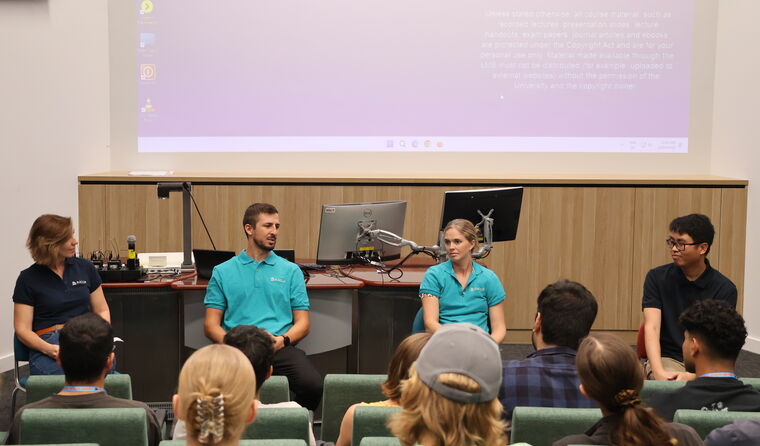News
Summit showcases ‘the best way medicine works’
GPs shared their stories at this month’s Rural Health Summit, with medical students learning what to expect as they begin hospital internship.
 RACGP Deputy Regional Director of Training WA Dr Bree Wright with medical students at the Rural Rescue Challenge as part of the Rural Health Summit.
RACGP Deputy Regional Director of Training WA Dr Bree Wright with medical students at the Rural Rescue Challenge as part of the Rural Health Summit.
What advice would you give to yourself before working as a hospital doctor as you embark on a career in medicine? Rural GPs shared their experiences and tips to help students with the transition at a recent RACGP-led workshop in Western Australia.
More than 130 medical students with an interest in a rural career attended the Rural Health Summit in Perth, on Whadjuk Nyoongar Country, across 11–13 April.
Described as the ‘premier rural health event for medical students around Australia’, it is run by the Australian Medical Students’ Association (AMSA) and brings together the current and future rural workforce.
This year’s event featured a diverse schedule of academic sessions, social events and workshops to help encourage a continued interest in rural health.
As part of a commitment to support the rural pipeline with a focus on medical students with a rural background or interest to pursue this pathway, the RACGP hosted a workshop to help students build their confidence in the transition from medical student to hospital doctor.
RACGP Deputy Regional Director of Training WA, Dr Bree Wright, led a panel including three other WA GPs who shared what they wished they had known when they began working as a hospital doctor: Rural Generalist Dr Sam Patterson, RACGP Medical Educator and rural GP Dr Ashlee Burgess, and rural GP Dr Jian Ong.
Dr Patterson said at the session that although he had ‘a lot to learn’ when stepping into the intern world, support was always in place.
‘Rurally you think there’s not going to be as much support, but there still is,’ he said.
Meanwhile, Dr Burgess said the biggest step up from medical student to hospital doctor is learning the difference between clinical knowledge and intuition and practical experience, and then being able to ‘put things into practice’ on a day-to-day basis.
She says the transition that follows from hospital intern to rural doctor nurtures the individual’s chosen pathway.
‘Something I wish everyone else knew so that we could attract more people to the country, is that you get rural rotations as part of your junior doctor years, so each of the hospitals has satellite towns attached to them,’ she said.
‘You can pick your intern rotation based on where you want to go rurally so that you can try before you buy. It’s a really good introduction to rural practice and … you get that time to build skills and see and do more.
‘Rural medicine from internship is awesome. You can start to build those networks, build those contacts and figure out whether it’s for you or not.’
 (L–R) RACGP Deputy Regional Director of Training WA Dr Bree Wright, Rural Generalist Dr Sam Patterson, RACGP Medical Educator and rural GP Dr Ashlee Burgess, rural GP Dr Jian Ong, at the Rural Health Summit panel workshop.
(L–R) RACGP Deputy Regional Director of Training WA Dr Bree Wright, Rural Generalist Dr Sam Patterson, RACGP Medical Educator and rural GP Dr Ashlee Burgess, rural GP Dr Jian Ong, at the Rural Health Summit panel workshop.
As well as the panel workshop, the RACGP joined the Rural Rescue Challenge at the Health Summit, where Dr Wright and four RACGP GPs led medical students through a range of clinical stations modelled on real-life emergency scenarios to improve their rural medicine skills.
Alongside Dr Wright, all three GPs from the panel workshop agree that a career in rural medicine is one that comes with many rewards.
‘I love rural medicine and the lifestyle that it affords me,’ Dr Burgess said.
‘When you get it right it’s so rewarding. Not only the medicine, but the lifestyle is a huge reason why rural medicine is great.
‘You build a community, you join the local footy team, whatever it may be, and you make lifelong friends.’
For Dr Patterson, who did not always plan on going rural but thought he would ‘give it a go’, the flexibility and fulfillment of doctor–patient relationships are what keeps him there.
‘Rurally, everyone’s on the same team and has to work together,’ he said.
‘You can do anything and make it work for you and your lifestyle. You build these long-term relationships with people … you take care of them and their family members, and you see them as a GP, you follow them up.
‘Then that just builds this bond between you and the patient, and they trust you wholeheartedly, they know you care about them as well – so that’s the best way medicine works if you’ve got that relationship.’
Log in below to join the conversation.
hospital internship medical students rural general practice rural generalist rural health summit Western Australia GPs
newsGP weekly poll
How often do patients ask you about weight-loss medications such as semaglutide or tirzepatide?